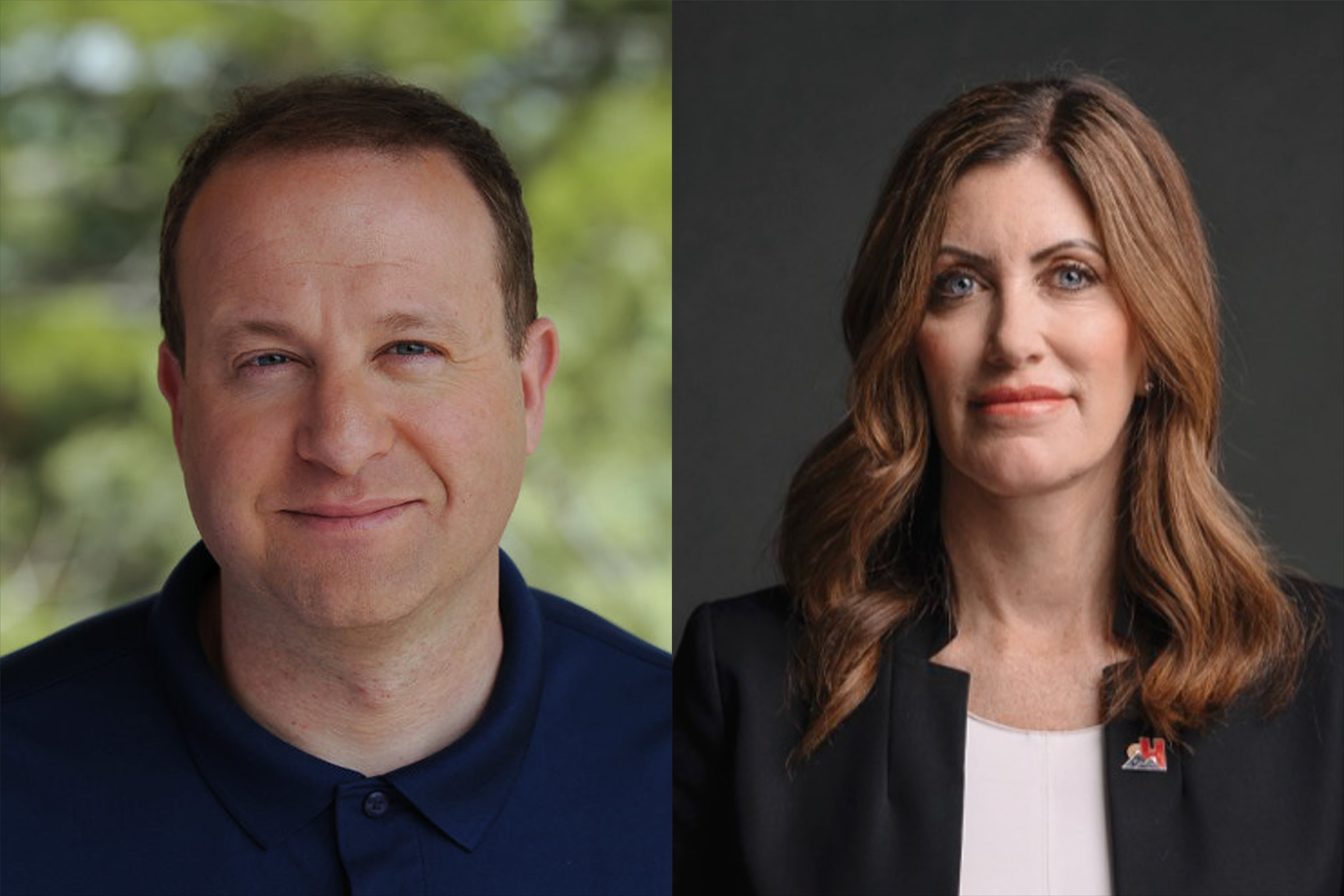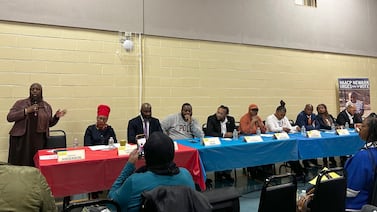Colorado voters will decide this November whether to give Democratic Gov. Jared Polis a second term or hand leadership to Republican Heidi Ganahl.
Ganahl, 56, is a University of Colorado regent and currently the only Republican holding statewide office in Colorado. She’s the founder of Camp Bow Wow, a large national pet care franchise. She also started SheFactor, a virtual and in-person community that aims to empower young women. Ganahl is the founder of Moms Fight Back and the Fight Back Foundation, organizations working on changes to the family court system.
Polis, 47, the incumbent governor, previously served in the U.S. House of Representatives and chaired the Colorado State Board of Education. He founded the New America charter network, which primarily serves older students who are recent immigrants. Polis also has founded several businesses, including the floral company ProFlowers.com and, with his family, the electronic greeting card company Blue Mountain Arts.
The economy and public safety have dominated the debates, but education is an important issue for both candidates.
Polis ran four years ago on a platform of making full-day kindergarten free to families (many previously had to pay tuition) and implementing a universal preschool program. Next fall, 4-year-olds should be eligible for at least 10 hours a week of state-funded preschool, but many details remain to be worked out. Polis says his priorities for a second term include seeing through the implementation of preschool, improving efforts to recruit and retain teachers, and strengthening connections between education and career opportunities.
Ganahl has characterized her education policies as based on “choice, competition, and transparency.” She supports giving public money directly to parents to use on tutoring or private school tuition. She also wants parents to have more say in education and schools to share more of their teaching and training materials. In particular, she’s raised concerns about how schools approach topics related to gender and sexuality and argued that schools need to get back to basics.
Colorado’s system of local control gives school districts significant autonomy to set their curriculum and other policies, and what a governor can achieve always depends on the makeup of the legislature.
Under any legislature, the governor plays an important role in education by proposing a budget, setting the tone at the top, and advocating for a legislative agenda. The governor appoints the heads of the departments of higher education and early childhood. The state education commissioner is hired by the State Board of Education, a separately elected body.
We asked the candidates eight questions about their education plans and priorities. These questions came from both our readers and our newsroom. Here’s what they had to say:
- What is the most important education problem in Colorado right now and what would you do to fix it?
- In your current role, what education accomplishment are you most proud of? What does it tell voters about your approach and your priorities?
- Given that Colorado is a local control state, what is the role of the governor in determining what gets taught in schools or other school policies?
- Colorado is set to roll out universal preschool in the fall of 2023. What does a successful preschool program look like? How will you ensure the benefits reach the most vulnerable and the program strengthens the early childhood sector as a whole?
- Colorado funds its public colleges and universities at low rates, leading to a higher tuition burden for families. Colorado high school graduates attend college at lower rates than in most other states, limiting their opportunities later in life. What will you do to help more Coloradans access high-quality postsecondary options?
- How will you increase funding to Colorado schools and more specifically raise teachers’ pay?
- What does a comprehensive plan for addressing the mental health of our youth look like in a Colorado you are leading?
- What steps are needed to improve school safety?
What is the most important education problem in Colorado right now and what would you do to fix it?
Ganahl: Sixty percent of our kids in Colorado can’t read, write or do math at grade level, they are being taught nonsense in the classroom, and violence at schools is skyrocketing while SROs [school resource officers] are told to stand down. As your governor, I will make sure our kids can learn to read and write by third grade with a common sense curriculum that is transparent to parents. I’ll make sure parents have the power to raise their kids with the values they are raising them with, and that the funding follows the families if they need to make different choices around school.
Polis: Every Colorado family should have access to their choice of a high-quality education. My administration has made major progress to improve our schools by increasing per pupil funding by nearly 20%, allowing for reduced class sizes and increased teacher pay, and ensuring that no matter where you live, your kids can attend preschool and kindergarten for free. Our biggest challenge is to ensure that every child has access to a terrific education no matter where they live in Colorado. We need to — and will — do more work to turn around underperforming schools and attract and retain great teachers.
In your current role, what education accomplishment are you most proud of? What does it tell voters about your approach and your priorities?
Ganahl: As a regent, I am most proud of my efforts to defend free speech. I was able to eliminate safe spaces and pass free speech legislation to affect all colleges in Colorado. I started a debate program at CU called “Free to Be,” which teaches kids how to debate in a feisty, collaborative way without creating conflict. I also championed efforts to bring back civics classes to CU. Outside of being regent, I have been a part of launching several charter schools. I also sat on Gov. John Hickenlooper’s school safety committee, which inspired me to launch a pilot assessment program for schools called School Safety 360.
Polis: Successfully delivering a high-quality education for every child is the great passion of my life. I’ve started public charter schools and chaired the State Board of Education. Four years ago, I promised that we’d pass free all-day kindergarten and universal pre-K while increasing funding for our education system. That’s exactly what we did — providing all-day kindergarten and starting soon, free universal preschool as well — to families across Colorado, making it easier for parents to balance their families and their careers while saving families almost $10,000 per child. We also increased per pupil funding for public schools by nearly 20%, a record investment in local schools that is reducing class sizes and increasing teacher pay.
Given that Colorado is a local control state, what is the role of the governor in determining what gets taught in schools or other school policies?
Ganahl: As governor, I will push for transparency in our schools. Parents deserve transparency for what their kids are being taught and how the money is being spent in our schools. Right now, 60% of our kids can’t read, write, or do math at grade level. $250,000 is spent per classroom, and only $50,000 of that goes to the teacher. I will work with school districts, teachers, and parents to create transparency that works for all.
Polis: Strong school districts, schools, and educators are the foundation to making sure Colorado has the best education system in the nation. I know how important it is that the state sets a high bar and provides the resources for schools to meet those expectations with accountability for results. It is the role of the governor to ensure that every Colorado kid has a chance to succeed in school and in life. We need to do more work to train excellent teachers, including supporting partnerships between school districts, community colleges, and colleges to ensure that our future workforce needs are met.
Colorado is set to roll out universal preschool in the fall of 2023. What does a successful preschool program look like? How will you ensure the benefits reach the most vulnerable and the program strengthens the early childhood sector as a whole?
Ganahl: A successful education program for all ages is one that works for all of Colorado. There is no such thing as free education, it comes from taxpayer dollars. With so many of our students unable to read or do math at grade level, especially those who are in third grade or younger, we need an education system that is serving our children well. I will make sure that the funding for our kids’ education follows them wherever they are going to school, starting in preschool.
Polis: Decades of research shows that high-quality early childhood education improves academic achievement, increases graduation rates, and prevents achievement gaps. As a businessman and a dad, I could not think of a better investment in Colorado’s future. The Colorado Universal Preschool Program will adopt nationally recognized best practices to help ensure that children are learning and supported during these critical years for child development, while also supporting parents so that they can work and save money. We got the funding and program in place, and now we’re going to implement universal preschool successfully across our state.
Colorado funds its public colleges and universities at low rates, leading to a higher tuition burden for families. Colorado high school graduates attend college at lower rates than in most other states, limiting their opportunities later in life. What will you do to help more Coloradans access high-quality postsecondary options?
Ganahl: As a CU Regent, I’ve seen how much our postsecondary options have lost value. Not all kids SHOULD go to a four-year university (although statistically it’s taking closer to six years to graduate). It’s time to fund students, not systems. I’d like to see us move to a 100% stipend-based state-funding model, having the College Opportunity Fund (COF) stipends follow in-state students to ANY accredited public or private college, university or trade school and cover up to four years of postsecondary education. As governor, I’d also encourage high schools to promote trade school and vocational programs so we can build the workforce of tomorrow.
Polis: We’re working hard to make high-quality education options affordable and accessible for every Coloradan. Partnering with the legislature, we ensured tuition was kept flat at nearly every public college and university in the state. We followed that up by capping tuition increases at most state colleges at 3% and tied scholarship amounts to the rising cost of attendance. We’re expanding concurrent enrollment opportunities to help high school students decrease the cost of attendance and time to degree. To expand access to higher education opportunities, we provided $44 million to support high-needs school districts and institutions and support innovation.
How will you increase funding to Colorado schools and more specifically raise teachers’ pay?
Ganahl: I am all in on school choice. We need to give power to the parents to choose the school that is best for their child. They should not be restricted by district boundaries, and they should be able to access education through any form of education that works best for them. I will empower families with ESAs [education savings accounts] so that they have the funding to make these decisions if they chose to go outside of their public school or district boundaries. I will work to increase teacher pay and make sure that they have the resources that they need to help our children be more successful.
Polis: We can’t have great schools without great teachers, and to do that, we need to increase teacher pay. Ultimately, this is an issue controlled by school districts, but that doesn’t mean we can’t work together to improve it. The most important step we can take is to increase funding for our schools, which I’ve worked to do consistently as governor. I have also strengthened other programs that help teachers, such as expanding loan forgiveness and making licensing renewal free for teachers. We have more work to do on this issue, and I will continue to advocate for increasing teacher pay.
What does a comprehensive plan for addressing the mental health of our youth look like in a Colorado you are leading?
Ganahl: For the first time in history, Children’s Hospital declared a state of emergency due to a mental health crisis for Colorado kids. As governor, I would launch RECONNECT Colorado: a massive effort to educate and mobilize our community to address the mental health crisis we are experiencing. This would include: implementing the 988 hotline, drastically increasing access to online, live and inpatient help, halting open air drug use, educating children and parents about drug and screen addiction, and building Oasis centers (mental health urgent care) in schools, rec centers, libraries, and existing urgent cares.
Polis: My administration is working to completely transform what has been an insufficient mental health system for Coloradans and their families. We have created the new Behavioral Health Administration to streamline state services, implemented the free 988 suicide and crisis hotline, and launched the successful iMatter program to provide therapy and drug treatment sessions to Colorado youth — all for free. To date, the iMatter program has already been used by more than 3,300 Coloradans ages 18 and under.
What steps are needed to improve school safety?
Ganahl: As governor, I will launch a School Safety SWAT Team program that creates standards and protocols to assess and guide schools. I will issue a Call for Innovation, combining input from community members, students, and parents to evaluate and pilot new approaches to keep our children safe. I will create a school safety accountability dashboard (by school and district) that would analyze the incidents of physical attack, drug use, bullying, sexual assault, weapons possession, and school suspensions to provide insights for school and community leaders. All of this would help us find gaps in certain schools that were leaving kids vulnerable but also allow parents to make empowered decisions about where they might send their children to school.
Polis: Making sure our kids have a safe space where they can learn is a top priority for my administration. We’ve strengthened physical infrastructure in schools through investments in everything from door locks and entrance systems to comprehensive training for school staff on threat assessment and response. Additionally, we have worked to invest in comprehensive behavioral health care support in schools, such as the iMatter program, and have increased school-based behavioral health professionals. It’s also important that a culture of support for all learners exists across our schools, and as governor I will always do my best to set a positive tone.
Bureau Chief Erica Meltzer covers education policy and politics and oversees Chalkbeat Colorado’s education coverage. Contact Erica at emeltzer@chalkbeat.org.





